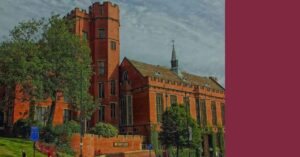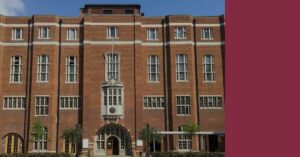Welcome to our UK Medical School review series. In this series, we work with current students to produce an in-depth overview of each UK Medical School, covering what it is like to study there, how the course looks and what you need to get in.
Today we are focussing on Oxford Medical School, a member of the Russell Group of UK Universities. Niamh, a fourth-year Oxford Medic, will share her experiences and insights as a current student.
Let’s get started with an overview of Oxford…
Overview Of Oxford Medical School
About Oxford Medical School
The University of Oxford is the oldest University in the English-speaking world. Medical teaching has occurred since the 12th century with the Clinical School fully established in 1946 for both postgraduate and undergraduate teaching.
2000 introduced the Medical Sciences Division, an internationally recognised centre of excellence for teaching and research in the clinical and biomedical fields, for which Oxford Medical School has ranked 1st in the world in Times Higher Education’s ranking of Universities for Pre-clinical, Clinical and Health Sciences 11 years consecutively.
Oxford offers a standard 6-year undergraduate course, split into Pre-clinical (Years 1-3) and Clinical (Years 4-6), along with an accelerated 4-year Graduate-entry course, both leading to the award of a medical degree (Bachelor of Medicine, Bachelor of Surgery).
Oxford Medical School

- University Age: 925
- UK Ranking: 2nd
- Pint Price: £5.00
- Alumni Notability: 10/10
- A-level Requirements: A*AA
- Places Available: 159
- Applicant Success Rate: 09%
- Teaching Style: Traditional
- Interview Style: Traditional
- Admissions Test: UCAT
Oxford Medical School Alumni
Oxford University has several notable alumni including 16 Nobel prize winners for Medicine, such as Sir Charles Sherrington, Sir Peter Medawar and Sir Peter J Ratcliffe.
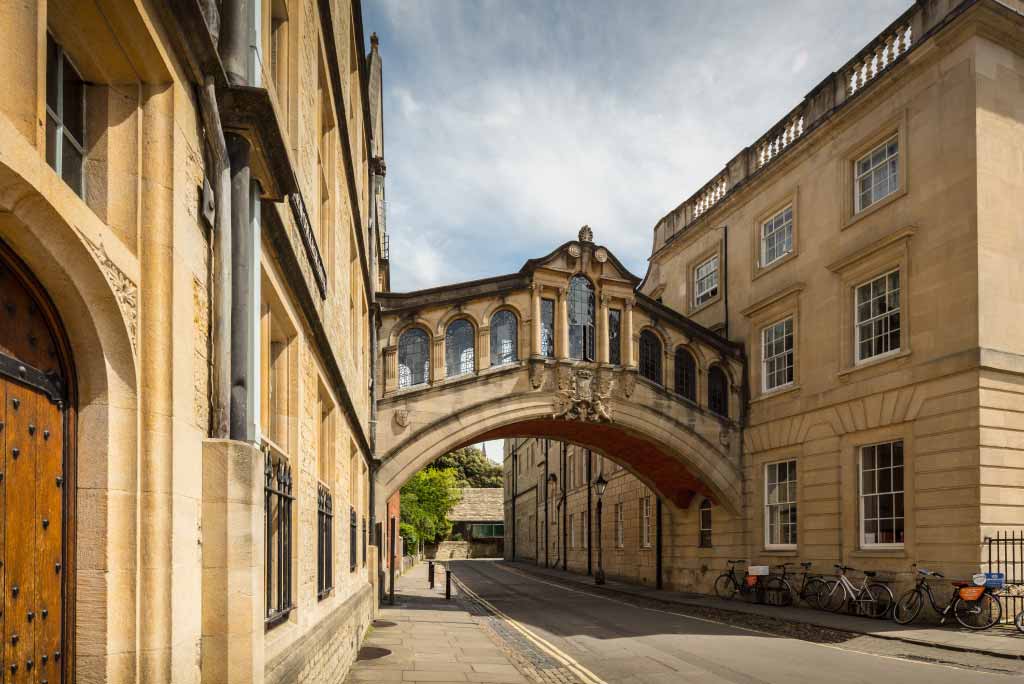
Why did you choose to study at Oxford?
“I chose Oxford largely due to the course structure. The first three years are very similar to any other university course, mainly comprised of lectures and practicals. In our third year, we had the opportunity to do a research project of our choosing, which involved working with some of the top researchers in their respective fields. The last three years are purely clinical and this gives us the opportunity to put to use our learned knowledge in a clinical setting.
Aside from this, Oxford is a vibrant city with plenty to do outside of Uni work. All in all, Medicine at Oxford provides students with the opportunity to excel not only in their subject but also in extracurricular fields with the vast array of clubs and societies.”
What is the best thing and worst thing about Oxford Medical School?
“The best thing about my Medical School is the wide range of opportunities that it provides, even outside of Medicine. This means that it’s almost impossible to ever be bored in Oxford. The worst thing about Oxford is probably the workload. It can get pretty intense with 2/3 essays a week, but time management skills are key to overcoming this. Overall, the positives definitely outweigh the negatives, but if writing 2000 word essays 3 times a week sounds like your worst nightmare, Oxford probably isn’t for you. To get the best out of your Oxford experience, you have to be prepared to work hard so that you can enjoy all the benefits of this university.”
Medical School Rankings
The 2023 UK Medicine League Table has already been published by The Complete University Guide. Oxford Medical School takes 2nd position with an overall score of 100%.
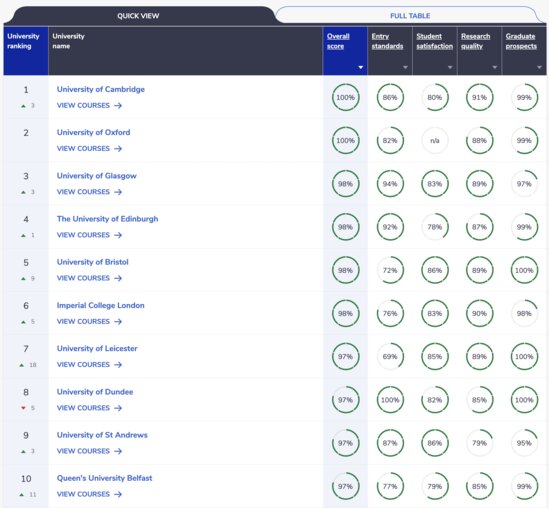
Rankings will, of course, differ between other tables; the Guardian includes different aspects to the Complete University Guide. When making your own decision on which table to look at, think about what you place more importance on, such as spending per student or career prospects. Keep in mind that all Medical Schools are highly ranked with excellent ratings across the board.
Oxford Medical School Fees And Financial Support
Yearly tuition fees for Undergraduate and Graduate Medicine courses at Oxford University are £9,250 for home students. International student fees for Pre-clinical years are £36,800 with Clinical years costing £48,600. Tuition fee loans are offered to all UK students by the Government and cover the course fees in full. Fees do not have to be paid upfront.
There are few scholarships available for Medicine at Oxford. In 2022 Oxford is offering bursary packages to home students with lower household incomes.
What are the Oxford living costs like?
“Living costs for rent vary depending on the college and whether or not you are living in college or renting privately. College accommodation is around £4500-5000, only for the 3 8-week terms (you have to move out at the end of each term). Private accommodation is usually around £6500 for 12 months, depending on where you live. Most places in Oxford are within walking distance but I would recommend a bike. If you are living a little further out, the bus costs around £2 for a single to just about anywhere in Oxford. In terms of a weekly budget, I would allow about £50. In college, bars pints cost around £2, but in any of the other pubs it’s around £5.”
Not sure where to start with your Medical School application?
Our Complete Bundle provides support for your Personal Statement, UCAT, BMAT and Interview and guides you to a successful application.
With our Complete Bundle, we guarantee that you will get at least one offer to study Medicine, or your money back.
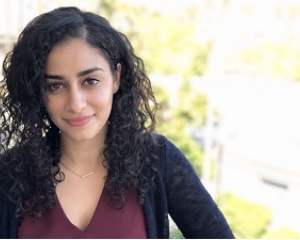


MEDICINE MASTERY BUNDLE
Not sure where to start with your Medical School application?
Get full, comprehensive support for your medical school application with 6med’s Medicine Mastery Bundle. Access everything you need for success as soon as you sign up.
UCAT.Ninja
UCAT.Ninja
What Is Studying At Oxford Medical School Like?
Medicine at Oxford is taught traditionally, split into Pre-clinical and Clinical stages. This allows students to gain a comprehensive understanding of medical science before applying that scientific foundation clinically. Pre-clinical years are taught by University lectures, tutorials, seminars and practical classes. Lecturers are drawn from Oxford’s extensive pre-clinical and clinical departments, and the courses are organised on an interdisciplinary basis so as to emphasise the interrelatedness of all aspects of the curriculum.
At the start of Year 3, students can apply to the Oxford Clinical School to undertake their clinical training. Students are placed at the John Radcliffe Hospital in Headington at which they follow a core curriculum and undertake some student-selected components. Students take progressively greater responsibility for directing their own learning across the years, with timetables in Years 4-6 supporting this transition by providing a mix of structured teaching sessions, supervised clinical experience and self-directed study.
What is a week in first year like at Oxford Medical School?
“We usually have lectures every day, but much less than other Medical Schools – usually 2/3 a day. There are also quite a few practicals to get through. These vary from anatomy prosections to biochemistry investigations, all the way to pathology labs.
We usually have around 2/3 practicals a week and they vary between 1 and 3 hours each. Aside from this, we have very little patient contact in first year. We have GP sessions where we sit in on GP clinics. However, these are quite rare, we only have about three of these a year (clinical exposure ramps up a lot from fourth year).
Tutorials are some of our most useful contact hours. We write essays for our tutorials based on a subject that we have been attending lectures in. However, these essays require much further reading outside of the scope of the lecture and so a lot of our time is dedicated towards independent study to complete these essays. Each week, we have about 2 tutorials, however, this varies based on the college.”
Oxford Medical School Degree Content
There are two Medicine courses offered at Oxford. The first is the Undergraduate Course.
Undergraduate Medicine Course
Pre-clinical studies are taught in 2 parts: First BM and Final Honour School. The First BM addresses the science that underpins Medicine, including the major body systems and their structure and function, as well as the clinical problems that can arise should they go wrong and the disease processes that underpin these. This lasts the first 5 terms. Following the First BM, students undertake the 4-term Final Honour School in medical sciences.
Students specialise in a biomedical science from a range of options and become adept at research literature, technical skills and scientific data handling, producing a final research project. The principles of anatomy course at the end of Year 3 teaches students the clinically-relevant aspects of anatomy in preparation for Clinical years.
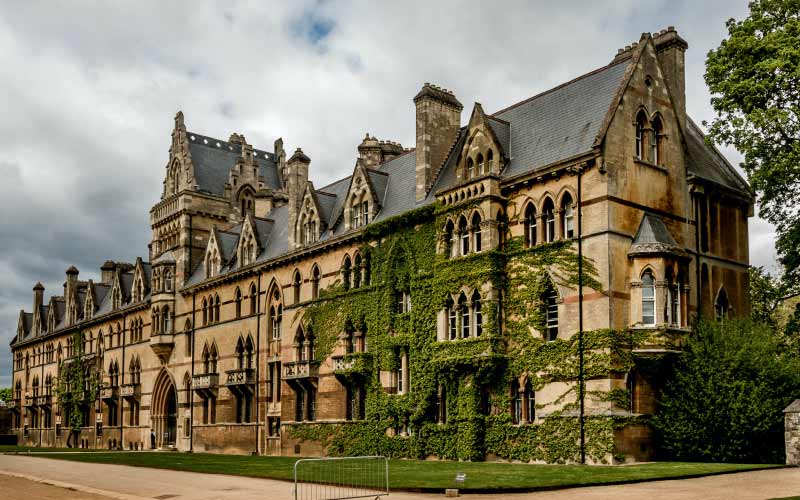
Tutorials are a key part of the teaching at Oxford Medical School alongside lectures and seminars. Students see their tutors and are taught weekly in small groups. Teaching is tailored to their individual interests.
Year 4 centres around Clinical Study. The Patient Doctor II course is the initial rotation that occurs in hospital and general practice to ensure students have sufficient skill level in history, examination and practice skills. Students will then undertake courses in GP, laboratory medicine, general medicine and surgery, which can take place at other district general hospitals in areas such as Buckingham, Milton Keynes, Northampton, Reading and Swindon.
Students pick a special study module from a range of 40 modules grouped into 5 themes: Medical Humanities, Chronic Diseases, Global, public and community health, Healthcare management, publishing and information and finally, Clinical and Basic Research, for which they are assessed on.
Year 5 allows students to build on clinical skills in speciality rotations. The year consists of 7-week blocks: Brain and Behaviour, Community Medicine, Orthopaedics, Rheumatology, Emergency Medicine, Women’s Health, Paediatrics.
Final year focuses on consolidating skills in care and management and prepares students for entry to Foundation training. Following general clinical studies, students have the opportunity to conduct an Elective in the UK or abroad and a final student assistantship.
Summary of the curriculum:
Pre-clinical studies: years 1-3
Part 1: all courses focus on the introduction to the fundamental aspects of the structure and function of the human body, and to the basis mechanisms underlying disease.
- Organisation of the body
- Physiology and pharmacology
- Biochemistry and medical genetics
- Medical sociology
- Patient and doctor course
Part 2:
- Systems of the body: integrative aspects
- The nervous system
- Principles of pathology
- Psychology for medicine
- Patient and doctor course
Part 3: Final Honour School
One from the following advanced options, plus a research project and extended essay. Focus on a spirit of enquiry and critical thinking.
- Neuroscience
- Molecular medicine
- Cardiovascular, renal and respiratory biology
- Infection and immunity
- Cellular physiology and pharmacology
- BA Examination
- Principles of clinical anatomy
Years 4-6
Year 4: Focus on Honing of Clinical Sciences
- Patient and doctor course II (+ GP residential attachment)
- Laboratory medicine
- Rotations in surgery and medicine
- Hospital attachment
- Special study module
Year 5: Focus on Specialist Clinical Areas
- Paediatrics, psychiatry
- Obstetrics and gynaecology and genito-urinary medicine
- Orthopaedics, A&E and musculo-skeletal medicine
- Clinical geratology, dermatology, palliative care, public health, primary care
- Neurology and neurosurgery, ENT, ophthalmology
Year 6: Consolidation of Skills and Preparation for Practice
- Final examination for BM BCh
- Senior rotations in medicine and surgery in Oxford and District General Hospitals
- Options in clinical specialities
- Special study modules, 10-week elective, work shadowing

The other Medical Course is the Graduate Course.
The first year of Graduate entry Medicine builds on your scientific background similar to that of the Undergraduate programme.
Second year involves teaching and a 9-week clinical pathology block interspersed with clinical attachments. Students are also expected to review and appraise clinical trials and research reports but do not have to produce their own research projects.
The final 2 years integrate with the Undergraduate Years 5 and 6.
What Makes Oxford Medical School Unique?
What is unique about your Medical School?
“At Oxford, I think the college system is pretty unique. It means that many of the people you get to know in university are studying subjects other than Medicine. Aside from this, the college environment is very supportive, meaning that you are on a personal level with many of your tutors (as in many cases there are only two others in your tutorial). This means that it is pretty much impossible to feel lost for too long without someone noticing and helping.
The college system also means that if you want to do sports a little more casually, you can join your college team. Another thing that makes Oxford unique is the 8-week terms. For the first three years, medical students are only in Uni for these three 8-week terms a year. This allows students the opportunity to engage in internships or even go travelling over the long breaks. However, it does mean that those 8-weeks are pretty intense, as the content all still needs to be covered. It is important to note though that holidays decrease dramatically in clinical years.”
Oxford Medical School Academic Entry Requirements
Oxford Admissions Statistics
| Number of applicants | |
| Applications per place | |
| Number accepted | |
| Success rate |
| Exam | Undergraduate Medicine |
|---|---|
| A-level | A*AA with at least a grade A in both Chemistry and one of Biology, Physics, Mathematics and Further Mathematics. |
| Advanced Highers | AA in Chemistry and one from Biology, Physics or Mathematics. Plus Highers AAAAA. |
| IB | 39 with 366 at HL. Required to take Chemistry and one of Biology, Physics or Mathematics to Higher Level. |
| Exam | Graduate Medicine |
|---|---|
| A-level | AAB with at least A in Chemistry and one of Biology, Physics or Mathematics. |
| IB | 36 with scores of 6 in subjects taken at Higher Level. |
| Degree | An upper second-class honours in your first degree in any subject. |
Craft an application worthy of Oxford with 6med!
Our Complete Bundle provides support for your Personal Statement, UCAT, BMAT and Interview and guides you to a successful application.
With our Complete Bundle, we guarantee that you will get at least one offer to study Medicine, or your money back.



MEDICINE MASTERY BUNDLE
Craft an application worthy of Oxford with 6med!
6med’s Medicine Mastery Bundle provides you with the best support for your Personal Statement, UCAT and Interview, ensuring you will earn your offer.
Personal Statement Crash Course
Personal Statement Crash Course
Oxford Medical School Personal Statement
Tutors are looking for scientific ability and aptitude for Medicine. Applicants need to show they have a realistic understanding of what a medical career will involve and that they have the potential. This is typically in reference to any work experience, voluntary work or extra-curricular activities that the student has undertaken that has given them the appropriate skills and attributes required of a Doctor.
Intellectual curiosity and engagement within experiences is also key as it conveys the impression that you are ready to take on the huge workload that Medicine brings and have the capacity for sustained and intense work. We always suggest reading the MSC Guide on the core values and attributes needed to study Medicine.
This is what Oxford states as their Medicine Selection Criteria – Personal Characteristics:
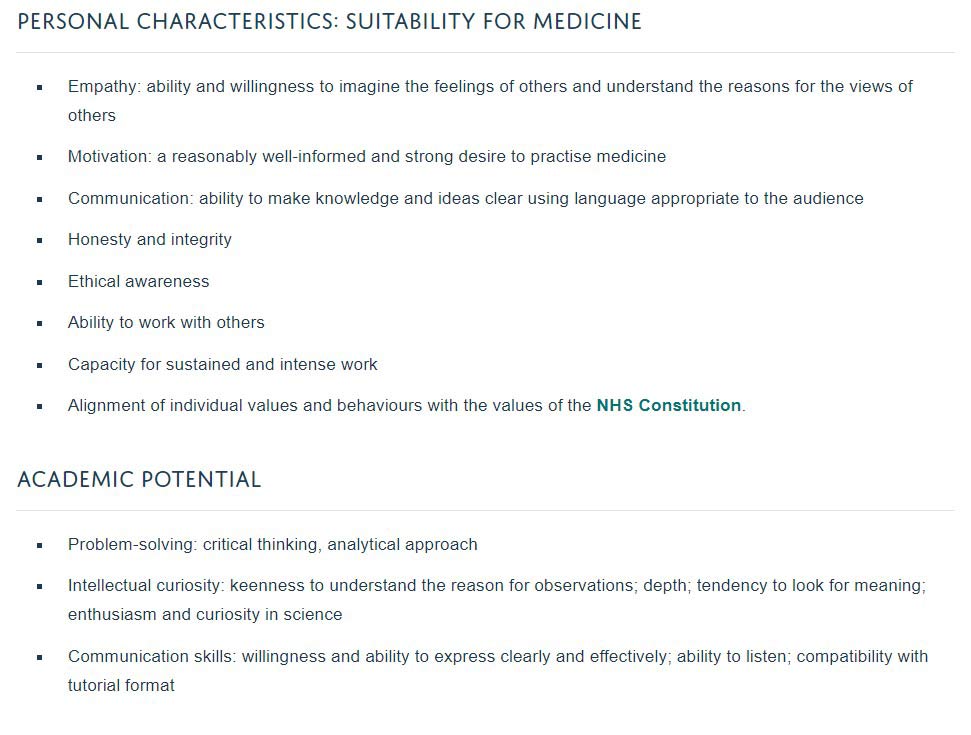
Oxford Medical School Admissions Tests
UCAT
Oxford previously required applicants to sit the BioMedical Admissions Test (BMAT), but since its removal in 2024, applicants for all medical schools in the UK are required to sit the University Clinical Aptitude Test (UCAT). Oxford doesn’t typically use cut-off scores for admissions tests, including the BMAT previously.
Not sure about what to do in the UCAT? Start with our Introductory UCAT Guide!
Oxford Medical School Interview
Interview Style
Interviews for Oxford take place in December. Those short-listed will be interviewed at 2 colleges – one of your choice and one allocated to you randomly. Students spend the first night at the college they receive their invitation letter from. Students are asked to be in Oxford for approximately 26 hours. Interviews are panel style with every candidate being interviewed by at least 1 practicing clinician. The number and format of interviews at each college may vary, however, each college uses the same selection criteria.
Selection criteria include personal characteristics making you suitable for Medicine such as empathy, motivation and communication, as well as academic potential involving problem-solving, intellectual curiosity and communication skills.
Example Oxford Medical School Interview Questions:
- Discuss antibiotic resistance and its future implications. (2018)
- Describe which anatomical structures are shown in this diagram. (2019)
- How would you reassure a patient who is worried about receiving their biopsy results? (2021)
- What qualities are needed to be a good doctor? (2020)
- Tell me about a recent medical technology advancement which you are interested in. (2020)
- How can you calculate the moles of water inside this glass? (2019)
- Interpret these graphs showing Type 1 and Type 2 diabetes being treated with insulin. (2021)
- What are the ethical implications of taking steroids for sporting activities? (2019)
- How much does a mountain weigh? (2021)
- How different would the world be if the wheel wasn’t invented? (2021)
- How would you measure the weight of your own head? (2021)
- Calculate what volume of wine can be drunk to reach the legal concentration of alcohol in the blood for driving? (2021)
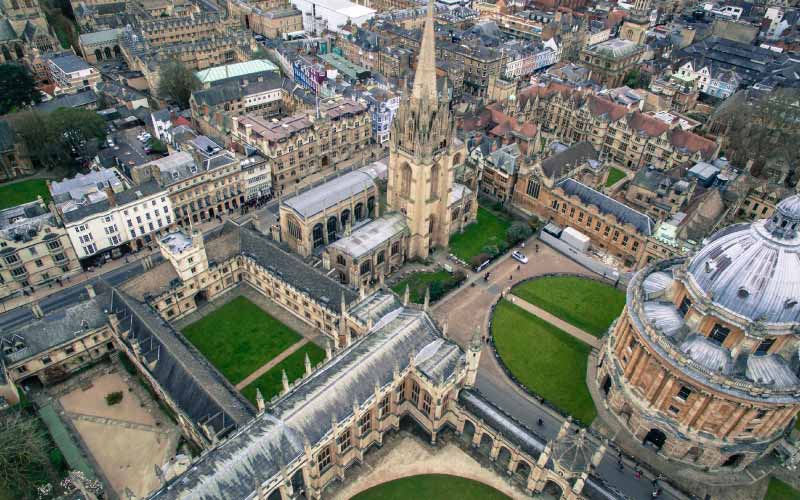
Extra-Curriculars at Oxford Medical School
Outside of study time, what do most people get up to?
“There’s a club for just about everything in Oxford. If you are an international student, you’ll find a society for the country you are from. If you’re from Scotland, Wales and Ireland there are also societies, there’s even a society for Northerners! If you look on the Oxford website, every sport you can think of is represented, from rugby to quidditch. The best thing about Oxford is that if you have an interest, there will be a club for it, and if there isn’t you can start one!
There’s a big music scene in Oxford, with many acapella groups, bands and orchestras. Colleges, also provide extracurricular events, organised by social secretaries. These events largely consist of bops, which are basically mini club nights, with only people from your college. Other events include tortoise races, garden parties and even balls. Balls are one of the main events in the Oxford calendar. Colleges usually put on a ball every three years but there is also a ball every year just for medical students. This usually consists mostly of the incoming first-years and is a great opportunity to meet the people you will spend the next six years with!”
What is the Oxford accommodation like?
“Accommodation again varies college to college and so I would recommend checking this before picking a college to apply to. I was lucky in that my college (St. Anne’s) was a 5-minute walk from lectures and labs. Oxford is a very small city though and the Medical School is fairly central, so it isn’t usually too far from anywhere. Accommodation again varies from college to college, some colleges have tiered accommodation with different prices.
My college, however, had a ballot system whereby the quality of your room in first year dictates your place on the ballot for second year ie. if you have a worse room in first year, you are more likely to get first pick for second year. It is important to consider that you usually need private accommodation for the 2nd three years of the course and it will have to cover you for extended terms as well.”
Oxford Medical School Contact
Email: Undergraduate entry – [email protected], Graduate entry – [email protected]
Telephone: +44 (0)1865 289561
Postal address:
Medical Sciences Divisional Office
University of Oxford
Level 3, John Radcliffe Hospital
Oxford
OX3 9DU
Advice for prospective oxford medical school students
What advice would you give to a first-year student starting at Oxford Medical School?
“First year can be quite tough, adapting to a new workload and being bombarded with a lot of new information, but it is important to make time to enjoy the fun things that Oxford has to offer. It is important to not worry too much about getting the highest possible grades anymore because with a course that is six years, it’s a marathon, not a sprint. Be sure to prioritise self-care because those 8-week terms can become overwhelming very quickly if you neglect this. Make sure to get involved in clubs and enjoy the unique things Oxford has to offer. If you are struggling with work, always let someone know sooner rather than later! Tutors are very keen to help and want the best for you. Finally, make sure to rest in your 6-week breaks, it is very easy to burn out if you aren’t taking time in your holidays to forget about work and relax.”
Check out our other UK Medical School Reviews:
Not sure where to start with your Medical School application?
Our Complete Bundle provides support for your Personal Statement, UCAT, BMAT and Interview and guides you to a successful application.
With our Complete Bundle, we guarantee that you will get at least one offer to study Medicine, or your money back.



MEDICINE MASTERY BUNDLE
Not sure where to start with your Medical School application?
Get full, comprehensive support for your medical school application with 6med’s Medicine Mastery Bundle. Access everything you need for success as soon as you sign up.
MMI Crash Course
MMI Crash Course
By Phoebe Baker








